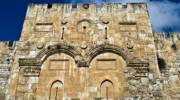Fortunately, it will not be the Amnestys, Corbyns, Tlaibs or Omars who decide the future of Judea and Samaria. That is for Israelis to determine.
In my last article, I discussed the outrageous and blatantly anti-Semitic decision by Amnesty International to label people doing business in Judea and Samaria as perpetrators of war crimes.
We shouldn’t have to keep repeating the historical and legal justifications for Jewish control of Judea and Samaria, but in a world where so many enthusiastically support BDS or have no problem with a Jeremy Corbyn as Prime-Minister-In-Waiting or elect such unapologetic anti-Semites as Rashida Tlaib and Ilhan Omar, we shouldn’t be shocked by the need to keep challenging and re-educating globalist/progressive Jew-haters.
Fortunately, it will not be the Amnestys, Corbyns, Tlaibs or Omars who decide the future of Judea and Samaria. That is for Israelis to determine, and it is clear from the policy statements of all the party leaders in the current Israeli election campaign that there is virtual unanimity around the question of retaining and developing the existing settlements in Judea and Samaria.
But even if there is widespread support in Israel for a permanent Jewish presence in Judea and Samaria, one has to marvel at the courage of the Israelis who relocate to the area. It is true that housing prices in the territories are relatively lower than in the rest of the country, but that incentive is more than offset by the critics’ continuous sniping, the very real terrorist threat and inconsistent support from their own government. It is far more likely that the migration and growth have less to do with financial considerations than with religious and nationalistic sentiments wherein these Israelis see it as a sacred duty and a right to reside in the ancestral lands of the Jews.
I believe it is helpful to understand the decision-making process of the Israelis who choose to live in Judea and Samaria, so my new mission is to ask some of them (hopefully, a representative cross-section) directly how and why they came to be residing in the territories. In that vein, allow me to present the story of two settlers whose story may provide a helpful window into their mindset and that of their neighbors.
Barak and Elice’s families came to Israel before there even was a State of Israel. The couple married in 2001, moving into a small apartment in Ramat Gan, a Tel Aviv suburb, and shortly afterwards, to a larger apartment in Tel Aviv. In 2006, they were moved to Givat Shmuel, also near Tel Aviv, as they wanted to live in an area that was more in sync with their religious orientation.
Many Reasons to Live in Judea and Samaria
In 2011, they made the decision to relocate to Samaria. There were many reasons behind their decision.
First, they believed with all their hearts that Jews had a right to live in a region that has always had a significant Jewish presence.
Second, they felt very strongly that Jewish settlement of Judea and Samaria would ensure that the land would be protected and nurtured.
Third, they were able to find a house that fulfilled their needs at a price they could afford and in an area that was only 40 minutes from Tel Aviv.
Fourth, the community they chose had other young families (they have two daughters) so the children would have friends and schoolmates nearby.
Fifth, the town they selected was at the westernmost edge of Samaria, meaning security was not quite as great a concern as for some of the settlements closer to Palestinian villages, and if there ever is a peace agreement between Israel and the Palestinians, their town would very likely remain within Israel.
Last, they decided on the location because it was close to both their families, meaning the grandparents would be able to see their granddaughters whenever they wished.
A Clear Political Statement
Barak and Elice were making an explicit political statement when they moved to Samaria. They believed wholeheartedly that Judea and Samaria is part of the historic Jewish homeland, and they felt it was important that young families live and grow in these reclaimed territories. To those of us who share their belief that Judea and Samaria are very much a component of the fabric of Jewish history, we need to salute the courage and commitment of these settlers who are willing to risk their lives to reclaim that heritage.
Eight years after the move, Barak and Elice have no second thoughts about their decision to move to Samaria. They would be even happier if the Israeli government formally annexed Judea and Samaria, meaning the Jewish residents of the territories would be on an equal footing with their fellow Israelis with respect to services, rights and obligations, but in the meantime, they are very grateful for the more positive position taken by the government since the election of a much more supportive U.S. regime.
Barak and Elice’s story is unique (as is every family’s), but it is not necessarily atypical. I will be speaking to other residents of Judea and Samaria in the coming months to learn more about their personal odysseys and to shine a light on these brave and proud ‘pioneers’.
Again, I urge Jews everywhere to donate to organizations that are raising funds to improve the health and educational facilities and the self-defence capabilities of the residents of Judea and Samaria. They need and deserve our respect and support.






















